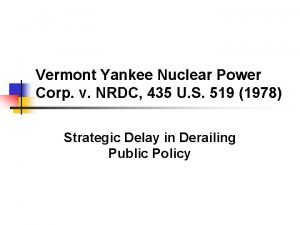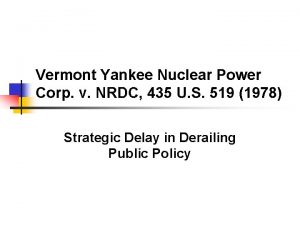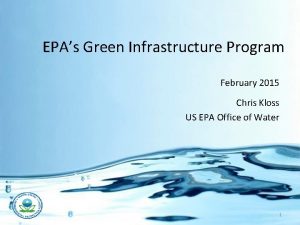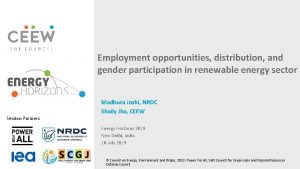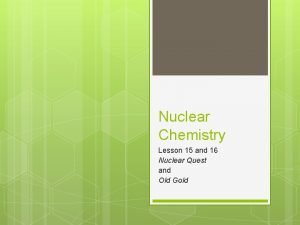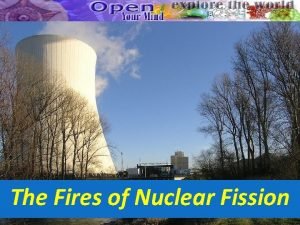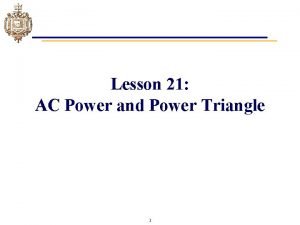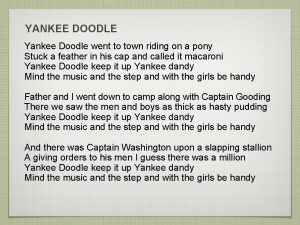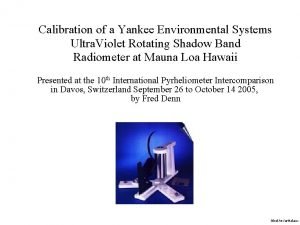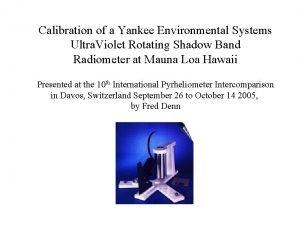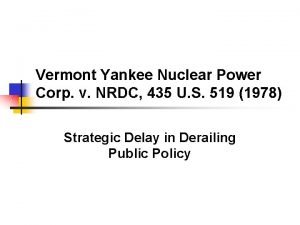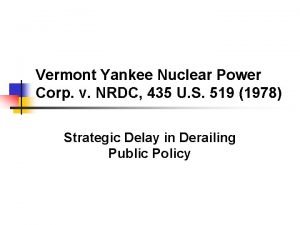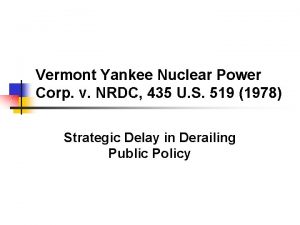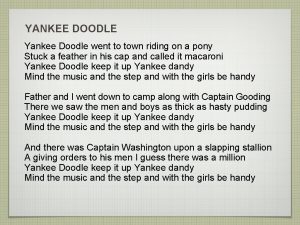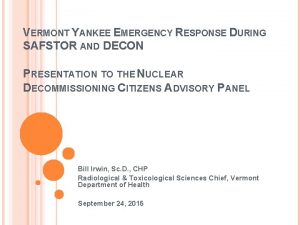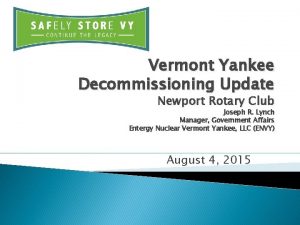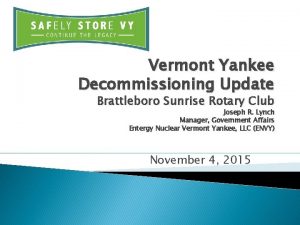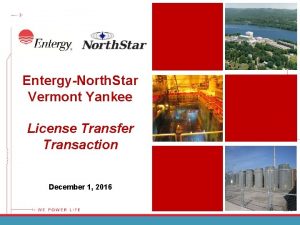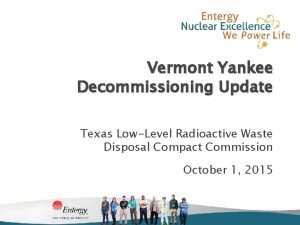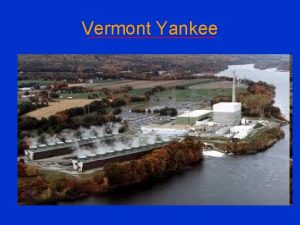Vermont Yankee Nuclear Power Corp v NRDC 435






![Overview n NEPA: n Established policy [Section 101(a)] n Set goals [Section 101(b)] n Overview n NEPA: n Established policy [Section 101(a)] n Set goals [Section 101(b)] n](https://slidetodoc.com/presentation_image_h2/c42247736d1450dd5ca01bed9159ff87/image-7.jpg)














- Slides: 21

Vermont Yankee Nuclear Power Corp. v. NRDC, 435 U. S. 519 (1978) Using rulemaking to limit issues on nuclear power plant permitting – the Supreme Court limits judicial additions to the APA.

Nuclear Power Plant Regulation n Originally regulated by the Atomic Energy Commission n Regulated and promoted nuclear power n Regulation was split off to the Nuclear Regulatory Commission because of conflicts of interest 2

Nuclear Power Plant Permitting n n Permitting is an adjudication n Specific party, specific facts n There is a right to community participation In this period, the plant owner first received a construction permit, and then applied for an operating permits when the plant was built. 3 n Politically difficult to deny an operating

The Permit History for Vermont Yankee n n n In 1967, pre-NEPA, Vermont Yankee is granted a construction permit. In 1971, post-NEPA, Vermont Yankee applies for an operating permit. The National resources Defense Council opposes the operating permit by challenging the Environmental Impact State required by NEPA. 4

NEPA – 1969 (Slides from DOE) n The National Environmental Policy Act (NEPA) of 1969 is the basic national charter for protection of the environment. NEPA 5

Overview n NEPA was necessary to ensure that Federal agencies would consider environmental concerns when making decisions, because often the statutes that created the agencies did not include an environmental mandate. NEPA 6
![Overview n NEPA n Established policy Section 101a n Set goals Section 101b n Overview n NEPA: n Established policy [Section 101(a)] n Set goals [Section 101(b)] n](https://slidetodoc.com/presentation_image_h2/c42247736d1450dd5ca01bed9159ff87/image-7.jpg)
Overview n NEPA: n Established policy [Section 101(a)] n Set goals [Section 101(b)] n Provided the means for carrying out policy (Section 102) n Established the Council on NEPA Environmental Quality 7

Objectives n The objectives of NEPA are to: n Declare a national policy that will encourage productive and enjoyable harmony between man and the environment NEPA 8

Title I Section 101 n Section 101(a) declares NEPA’s general policy: It is the continuing policy. . . to use all practicable means and measures. . . to create and maintain conditions under which man and nature can exist in productive harmony, and NEPA fulfill the social, economic, and other 9

Objectives n n Promote efforts that will prevent or eliminate damage to the environment and biosphere and stimulate the health and welfare of man Enrich the understanding of the ecological systems and natural resources important to the Nation NEPA 10

Objectives n n How does NEPA accomplish these objectives? By ensuring considerations of environmental issues before conducting major Federal actions through the requirement of an environmental impact statement before federal permitting or funding of projects with a significant impact on the environment. NEPA 11

The Environmental Impact Statement n n This is a detailed report that must include: n The catalog of potential environmental impacts n The economic and environmental cost of those impacts n The economic and other benefits of the project n Alternatives that have lower environmental impacts. NEPA allows citizen suits to challenge the 12

NEPA Litigation n Permitting, and/or funding, cannot go forward until the environmental impact statement is complete to the court satisfaction. NEPA litigation and additional studies to augment the environment impact statement can take years. The only requirement of NEPA is that the environmental impact statement be complete. 13

The EIS Issues in Vermont Yankee n n Nuclear waste disposal n The key rulemaking issue Alternatives to building the plant n The NRDC also attacked the EIS for failing to consider alternatives to building the plant. n The major alternative was increased energy conservation. 14

Nuclear Waste and the EIS n n Why is nuclear waste disposal a big issue for NEPA? n Did the NRC or the nuclear industry have a good solution in 1971? n What would this mean about the completeness of the EIS? Strategically, why does the NRDC want the court to require the EIS to analyze the long term environmental impact of 15

Avoiding the Issue n n What does the NRC do to avoid making this a subject of the adjudication process? n Why does it want to eliminate the disposal of nuclear waste from the permitting process? How will making a rule on waste disposal remove it from the hearing process? n Classic narrowing of adjudication 16

The Rulemaking n n n What additional process was provided beyond the usual APA notice and comment? Which alternative did the NRC adopt after the public comment? n. . specified numerical values for the environmental impact of this part of the fuel cycle, which values would then be incorporated into a table, along with the other relevant factors, to determine the overall cost-benefit balance for each operating license. Why is the NRDC unhappy with this alternative? 17

DC Circuit n n What does the DC circuit want the NRC to do to improve the due process in their rulemaking? n “it likewise clearly thought it entirely appropriate to "scrutinize the record as a whole to insure that genuine opportunities to participate in a meaningful way were provided” Did it specify exactly what procedures should have been used? 18

The Role of the APA n n n Did the rulemaking comply with the APA? What is the lower court's theory about the APA requirements? n Floor or ceiling? Who does the court think should decide on the appropriate procedures? n Does this look like Goldberg or Matthews? 19

The Substantive Issue n n What is the DC court's real problem with the rulemaking on waste management? n Did the NRC’s rule solve the waste problem? n Can an agency put off a problem by assuming that a solution will be found in the future? We are 40+ years latter - who was right about the waste disposal problem? n (the real problem is that we can’t decide whether we want to permanently dispose of the waste or reserve the possibility of 20

The United States Supreme Court n n What does the United States Supreme Court think about the role of the APA in setting process? n Who gets to make the call - agency or courts? In the court's view, what is the real issue? n "The fundamental policy questions appropriately resolved in Congress and in the state legislatures are not subject to reexamination in the federal courts under the guise of judicial review of agency action. Time may prove wrong the decision to develop nuclear energy, but it is Congress or the States within their appropriate agencies 21 which must eventually make that judgment. “
 Vermont yankee nuclear power corp. v. nrdc
Vermont yankee nuclear power corp. v. nrdc Vermont yankee v nrdc
Vermont yankee v nrdc Chris kloss
Chris kloss Madhura joshi nrdc
Madhura joshi nrdc Lesson 15 nuclear quest nuclear reactions
Lesson 15 nuclear quest nuclear reactions Fisión nuclear vs fision nuclear
Fisión nuclear vs fision nuclear Power triangle diagram
Power triangle diagram Went to town riding on a pony
Went to town riding on a pony Yankee clipper contest club
Yankee clipper contest club Preposition song yankee doodle
Preposition song yankee doodle Yanke city araştırması
Yanke city araştırması Yankee candle czech republic
Yankee candle czech republic Yankee environmental systems
Yankee environmental systems Yankee clipper contest club
Yankee clipper contest club International equity market definition
International equity market definition Hawthorne araştırmaları
Hawthorne araştırmaları Alphadictionary yankee test
Alphadictionary yankee test Yankee bonds
Yankee bonds The world turned upside down yankee doodle
The world turned upside down yankee doodle Preposition song yankee doodle about above across after
Preposition song yankee doodle about above across after Yankee environmental systems
Yankee environmental systems Positives and negatives of fossil fuels
Positives and negatives of fossil fuels
